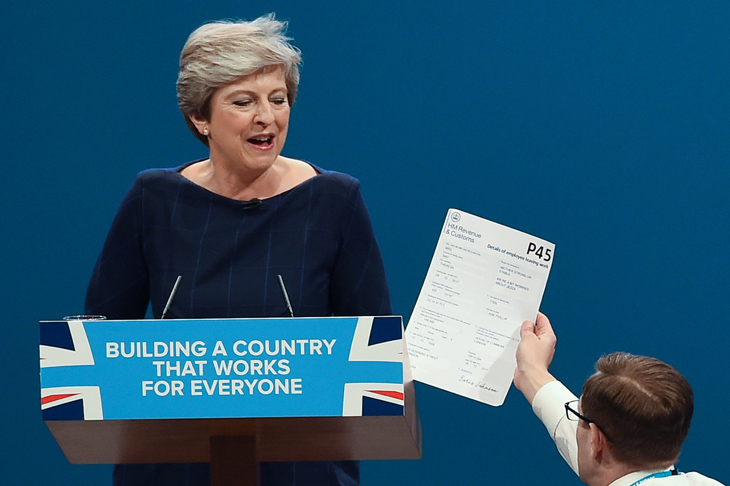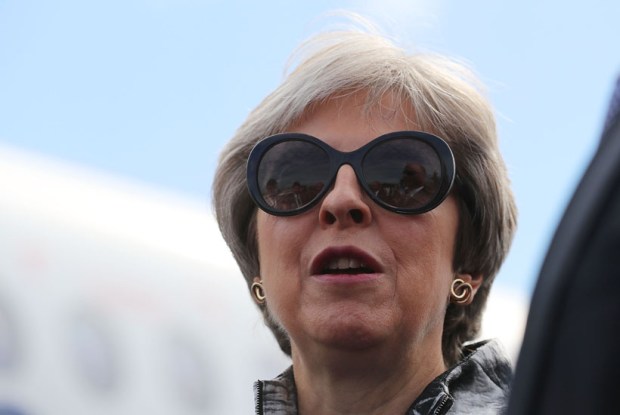For those who don’t want Jeremy Corbyn to be prime minister, the Tory conference was half encouraging and half depressing. The encouraging part is that the Tory party has grasped the problem. There seems to be near universal acceptance that a ‘rigged’ housing market is making the under-40s feel that they have little chance of ever owning a home — and you can’t expect those without capital to be capitalists. But the solutions that the Tories are currently offering are inadequate.
The decline of the property-owning democracy is an existential threat to the Tory party. Homeowners tend to vote Tory, so the fact that home ownership is at a 30-year low has, obvious political implications for the party. At the last election, 55 per cent of those who owned their home outright voted Conservative, as did 43 per cent of those with a mortgage — but only 31 per cent of private renters.
The gap between the voting behaviour of renters and owners has never been larger, perhaps because so many renters now think they’ll never be owners. The Tories cannot afford for the proportion of homeowners in the electorate to fall further. For their own political survival, and for the country, Tories need to build more homes. Theresa May did announce a plan for more council properties and Philip Hammond promised more money for help to buy, but these are sticking-plaster solutions. I understand that there will be further housing measures in the budget, but they need to be truly radical if they are to ensure that the fall in home ownership is reversed before the next election.
The Tories are also divided according to mood. One former cabinet minister told me: ‘That smell you can smell, that’s the smell of a political party dying.’ But there is an upbeat faction. One of those closely involved in David Cameron’s two electoral successes argues that this was always going to be a ‘clear the decks’ conference, dealing with the fallout from the election campaign. This Cameroon argues that the fact the party has diagnosed the problem means it can now be solved.
There is no election tomorrow. The Tories might have more than four years to turn things around. But they should remember that by 2022 they will have been in power for 12 years. This means voters will be particularly sceptical of promises that they make. They will judge them on their record — and the Tories will have to make sure that it is good enough.
This means that they cannot afford just to present themselves as the risk-free option. Faced with Jeremy Corbyn and John McDonnell, it is tempting to offer sanity and stability — but the sheer radicalism of Brexit rules that out. You cannot be the government implementing the most dramatic change in Britain’s affairs in decades and simultaneously the safe-pair-of-hands party.
It is not just Brexit which means the Tories must be radical. We are living through an era of rapid change. The iPhone is only ten years old. But we have already come to take it for granted that we have in our pocket, in one device, a camcorder, a GPS system and the ability to access the internet. Technology will not only change how we live, but also transform the nature of the economy —and the pace of change is about to increase. A party whose aim is to keep things as close to where they are now will not succeed in this environment.
The Tories need to have a message for those workers fearful about automation and what it means for their jobs. But this digital revolution is also a political opportunity for them to present themselves as the pro-consumer party who are instinctively comfortable with a more diversified economy in which the state is less powerful.
Those under 40, the group that the Tories have such a problem with, are far more comfortable with this new economy. Just look at how baffled young Londoners were by Sadiq Khan’s trenchant support of Transport for London’s plan to ban Uber. The Tories must show that they are the party that understands this new economy and that there is nothing modern about Corbyn’s 21st-century socialism.
Most important, the Tories must try their hardest not to splinter over Brexit. The cabinet could agree with Theresa May’s Florence speech because it didn’t address the really contentious question of what sort of relationship with the EU the UK actually wants. But when the talks move on to trade, probably in the new year, this will have to be addressed. When the EU sets out its negotiating mandate for the trade talks, the UK will have to respond in kind. At that moment, one side in this cabinet argument is going to be disappointed, but it must, for the sake of the party, attempt to present a united front.
The increasing bitterness of the cabinet’s Brexit row also has implications for that other great Tory topic: the leadership. Any new leader must be seen as the person who can unite the party, which makes a Brexit moderate likely, and strengthens the hand of those who want to go for a fresh face
Too many Tories feel that the party is heading for a defeat as unavoidable as the one that it suffered in 1997. But this need not be the case. As Ruth Davidson pointed out, the political wheel turns faster these days — you can be cock of the walk one minute and yesterday’s news the next. Corbyn will struggle to keep up his momentum for the next four years. He is also far easier to beat than Tony Blair as he is determined to win from the left. Note how he always talks about housing in terms of public provision rather than private ownership.
Admitting you have a problem is the first step to solving it. The Tories have done that this week. Now, they need to show the public that they know how to sort it.
Got something to add? Join the discussion and comment below.
Get 10 issues for just $10
Subscribe to The Spectator Australia today for the next 10 magazine issues, plus full online access, for just $10.
You might disagree with half of it, but you’ll enjoy reading all of it. Try your first month for free, then just $2 a week for the remainder of your first year.















Comments
Don't miss out
Join the conversation with other Spectator Australia readers. Subscribe to leave a comment.
SUBSCRIBEAlready a subscriber? Log in